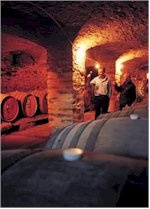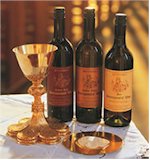


They settled at a site called Open Ranges in the beautiful Clare Valley and established Sevenhill, the oldest existing winery in the Clare Valley. Initially the main purpose of the cellars was to provide sacramental wine for religious use and this has been ongoing. Sevenhill Cellars now produce white, red and fortified wines as well as sacramental wine.

The Jesuits renamed Open Ranges Sevenhill because of their hope that the immediate area would become a centre of Catholicism for the North - another little Rome with seven hills. They even named the stream that flowed through the property The Tiber. Sevenhill Cellars are today nestled among the vineyards close to St Aloysius Church and feature a well tended grassed picnic area with tables, seats and shade trees. Sevenhill winery produces all its own fruit on 72 hectares of vineyard.
Twenty varieties of grapes are grown yielding an average annual crush of 450 tonnes. The wine is completely processed on the property including the bottling of the finished wine (35,000 cases per year). This is a far cry from the pioneering days of the first Jesuit winemaker Br Schreiner. He and Br Schneider built a wine press in 1863 capable of pressing a formidable load of 4 buckets of grapes at a time!
The production of altar wine today accounts for 30% of the winery's production. Made in the style of a sherry and in conformity with the requirements of Canon Law is sold to all Christian denominations in Australia for use in religious services. It is exported to India, Indonesia, Papua New Guinea, Singapore, Guam, Borneo and Pacific Isles.

In the history of Sevenhill Cellars, there have been 7 Jesuit Brother Winemakers. In September 1851 Br Schreiner bought some vine cuttings from Bungaree Station and planted them on the left hand side of the present road to the winery. This planting marks the beginning of Sevenhill Cellars and makes it the oldest winery in the Clare Valley. These vines were planted initially to meet the need for altar wine.
Brother John May SJ, Jesuit Winemaker Emeritus has been with Sevenhill Cellars since 1972. He was instrumental in building the winery up to the technologically advanced state of today. Winemaker Liz Heidenreich joined Sevenhill in 2005. Adelaide born and educated, 34-year old Liz has a wealth of knowledge and experience gained in Australia and overseas. "One of the historical treasures of Australia; the oft-photographed stone wine cellars are the oldest in the Clare Valley, and winemaking is still carried out under the direction of the Jesuitical Manresa Society, and in particular Brother John May. Quality is very good, particularly of the powerful Shiraz; all the wines reflect the estate-grown grapes from old vines!" -Wine Companion.com.au

























